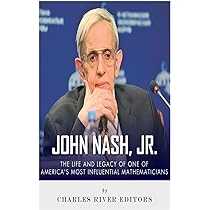Studying Mathematics and Economics
After completing his undergraduate studies, Nash went on to pursue a Ph.D. in mathematics at Princeton University. It was during his time at Princeton that he made groundbreaking contributions to the field of game theory, which would later earn him the Nobel Prize in Economics.
Nash’s work in game theory involved the study of strategic decision-making and the analysis of interactions between individuals or groups. He developed the concept of Nash equilibrium, which is a solution concept in non-cooperative games where each player’s strategy is optimal given the strategies of the other players.
His work on game theory revolutionized the field of economics and had a profound impact on various disciplines, including political science, biology, and computer science. Nash’s insights and theories continue to be widely studied and applied today.
Throughout his career, Nash remained dedicated to the pursuit of knowledge and continued to make significant contributions to mathematics and economics. His passion for these subjects and his groundbreaking work have left a lasting legacy in the field of game theory and have inspired countless researchers and scholars.
Nash’s contributions to game theory extended beyond the concept of equilibrium. He also made significant advancements in the field of bargaining theory, where he introduced the concept of the Nash bargaining solution. This solution provides a fair division of resources between two parties engaged in a negotiation and has been widely applied in various real-world scenarios, such as labor negotiations and international diplomacy.
In addition to his theoretical contributions, Nash’s accomplishments also include practical applications of his ideas. His work on game theory has been used to analyze and improve economic systems, design efficient auctions, and understand the behavior of financial markets. His insights have also been applied in fields such as evolutionary biology, where game theory provides a framework for studying the evolution of cooperative behaviors in animal populations.
Nobel Prize in Economics

John F. Nash Jr.’s groundbreaking contributions to the field of game theory were recognized with the highest honor in economics, the Nobel Prize. In 1994, Nash, along with two other economists, Reinhard Selten and John Harsanyi, was awarded the Nobel Prize in Economic Sciences for their work on game theory and its applications.
Nash’s work on game theory has had a profound impact on various fields, including economics, politics, biology, and computer science. His theories have been applied to analyze and understand a wide range of phenomena, from business competition to evolutionary biology to international relations.
Receiving the Nobel Prize brought international recognition to Nash’s work and solidified his status as one of the most influential economists of his time. It also served as validation for his unconventional approach to mathematics and his perseverance in the face of personal challenges.
John F. Nash Jr. left a lasting legacy in the fields of mathematics and economics. His groundbreaking work in game theory revolutionized these disciplines and continues to have a profound impact on various fields of study.
One of Nash’s most significant contributions was his development of the concept of Nash equilibrium, which is a fundamental concept in game theory. Nash equilibrium is a state in which each player in a game has chosen a strategy that is optimal given the strategies chosen by the other players. This concept has been widely applied in various fields, including economics, political science, and biology.
Nash’s work on game theory also had practical applications. It provided insights into the behavior of individuals and groups in competitive situations, which has been used to analyze and predict outcomes in various real-world scenarios. For example, game theory has been applied to understand and predict the behavior of firms in oligopolistic markets, the strategies of politicians in election campaigns, and the actions of countries in international relations.
Nash’s legacy extends beyond his academic achievements. His life story, as portrayed in the movie “A Beautiful Mind,” brought attention to the struggles and triumphs of individuals with mental illness. Nash’s battle with schizophrenia and his eventual recovery served as an inspiration to many, highlighting the importance of mental health awareness and the potential for individuals with mental illness to make significant contributions to society.
Influence on Game Theory
John F. Nash Jr. made significant contributions to the field of game theory, which is the study of strategic decision-making. His work revolutionized the way economists and mathematicians understand and analyze competitive situations.
One of Nash’s most influential contributions is his concept of the Nash equilibrium. This is a solution concept in game theory that describes a stable state in which no player has an incentive to change their strategy, given the strategies of the other players. The Nash equilibrium has become a fundamental concept in the field and is widely used in various applications, including economics, political science, and biology.
Nash’s work on non-cooperative games also had a profound impact on the study of economics. Prior to his contributions, economists primarily focused on cooperative games, where players can form coalitions and make binding agreements. Nash showed that even in non-cooperative settings, where players act independently, there can still be stable outcomes.
Furthermore, Nash’s ideas have influenced various fields beyond economics. His work has been applied in computer science, evolutionary biology, and even philosophy. The concept of the Nash equilibrium has been used to analyze and understand various real-world situations, such as pricing strategies in oligopolistic markets, negotiations between countries, and even the behavior of animals in nature.
Conclusion


Emily Bibb simplifies finance through bestselling books and articles, bridging complex concepts for everyday understanding. Engaging audiences via social media, she shares insights for financial success. Active in seminars and philanthropy, Bibb aims to create a more financially informed society, driven by her passion for empowering others.
